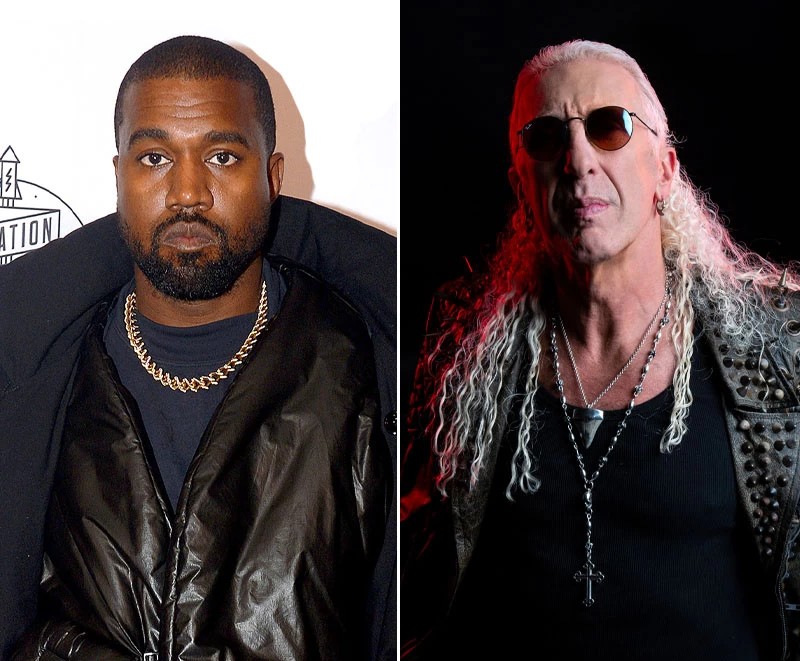West vs Snider: Musicians in Politics
Kanye West (left) and Dee Snider (right) are two musicians from different eras that have both gotten involved in politics.
March 23, 2023
As long as music and entertainment has been around, certain members of society have had problems with its contents. In modern times, there have been two main occurrences of this, with public backing falling on very different sides. The first case of this was in 1985 involving Dee Snider of the rock band Twisted Sister, and the second case was in 2022 with Kanye West.
Dee Snider
As the hard rock revolution became more and more evolved, the nature of the music became progressively darker and dirtier. Parents and politicians across the country petitioned this ‘devil music’ and ‘rock porn’, demanding something be done about it. Led by Tipper Gore, the organization Parents Music Resource Center (PMRC) advocated to rate music in a similar fashion to television and movies, using a modified G, PG, PG13, and R system. They called for the rating to be clearly displayed on album covers and any album with an old enough rating had to be purchased by an adult.
Naturally, teenagers and rock musicians alike were outraged by this as they felt it went against the freeing spirit of rock and roll. The rock community banded together to protest this potential law. Musicians John Denver (who famously sang Country Roads), Frank Zappa (of the band The Mothers), and Dee Snider (of the band Twisted Sister) all stood up to the Senate in separate chambers. Arguably the most influential of these was the case of Dee Snider.

Front man and lead singer of a hair rock band, Dee Snider has a reputation for being loud and hard to miss. He carried this persona with him to Congress, arriving with his iconic spike-studded denim vest and full teased hair. Snider was a poster boy for the rock community, which is exactly what Congress wanted. In their eyes, it would be easy to take down such a clear stereotype and use him to ‘expose the vulgar side of music’. Yet Snider took all of the Senate by surprise.
Snider’s first impact statement came in a quote of Tipper Gore. Her husband at the time, Al Gore, was leading the Senate’s discussion. Tipper Gore claimed that a recent Twisted Sister song, titled “Under the Blade”, was about bondage and sadomasochism. Snider challenged this point by revealing the song was about the Twisted Sister guitarist, as he was preparing for throat surgery to remove polyps. Snider directly said to Congress, “Mrs. Gore was looking for sadomasochism and bondage, and she found it.” This statement left such an impact on Al Gore that he was forced to switch his line of questioning.
Arguably the most famous Twisted Sister song, “We’re Not Gonna Take It”, was also brought up for discussion. Ironically, the PMRC didn’t have a problem with the lyrics, but with the video content. They said the violence in the video was too graphic for younger viewers. Snider retorted by saying the alleged ‘violence’ sequences were choreographed side-by-side with old Looney Toons scenes. Snider said if the PMRC was to ban the music video, they would have to ban all forms of media depicting malicious physical contact, no matter how imaginative it may be. This creates an impossible slippery slope, which the PMRC was not able to get out of.
The final point of Tipper Gore and the PMRC was that hard rock promoted violent sexism. Tipper Gore claimed Twisted Sister and other hard rock bands are marketing over-sexualized and misogynistic clothing depicting women in sensitive settings. Snider challenged Gore to produce such a shirt. When it was proven she was unable to, Snider explained how one of the founding ideas of rock is freedom of both genders.
By the end of the Congressional discussion, Snider had embarrassed the prosecution and the PMRC fell apart. Years later, Al and Tipper Gore divorced, citing this scandal as part of the problem. Remnants of the PMRC did end up getting the Parental Advisory law passed, which required explicit music to display the legal symbol on their album covers, yet the overall lack of censorship was enough for the rock community to consider it a success.
Kanye West
With the rise of social media, superstardom has become a much more tangible reality. With the use of platforms like Twitter, Kanye West has been able to extend both his fame and influence. His interest in politics became clear when he announced he would be running for president in 2020 and again in 2024.
The campaign of the 2020 election took a very faith-oriented approach. He advocated for the arts, environmental protection, a strong national defense, and restoring prayer in schools. He opposed any action he believed would infringe on the ‘culture of life’, including capital punishment and abortion. He also supported the Black Lives Matter protests, donating $2 million to victims of the rioting and paying off the college tuition of George Floyd’s daughter.
West missed the deadline in 29 states to be added to the ballot. Despite numerous lawsuits and appeals, West didn’t make it far in the election. Lots of his viewpoints were controversial, such as his support for ex-president Donald Trump. With a total of 66,641 votes, West vowed that he would succeed more with a new campaign.

The 2024 campaign is much more controversial than the one in 2020. Here, West expressed his love for the Nazi party and claimed that he is one. He also adamantly denies the existence of the Holocaust, saying that it shouldn’t be taught in schools. In an interview with McInnes, West proposed the idea that all Jewish people should be removed from power. West also opposes the idea of education reform and mental health awareness. He claims that education should be more focused on agriculture and prayer and that the education system is the cause for most mental health defects, such as ADD (Attention Deficit Disorder).
Because of these statements, 69% of Americans now have a negative perception of West. West also has had problems with social media, the resource that he once used to gain popularity. He had previously been banned from both Twitter and Instagram because of the offensive language and threatening nature of his commentary.
West still hasn’t been able to gain back the influence and popularity he once had. This has severely impacted both his musical career and his political power. Statistically, his supporters have plummeted since he’s shown his anti-semantic views.
Many have questioned why there has been such a change between the public’s view of celebrities in recent times. Others have questioned why celebrities are getting more outspoken about their controversial views. Many agree that social media plays a big importance in this. Back before it existed, celebrities had to fight for attention via television and live appearances. It was normal for them to keep their more personal opinions to themselves. Now, celebrities are expected to display their lives to the world around them, no matter how controversial. Yet this still does not justify Kanye’s actions. In the end, both artists fought for free speech. The pinnacle difference that split the public was Snider fought for ideas of freedom while West fought for ideas of oppression.









